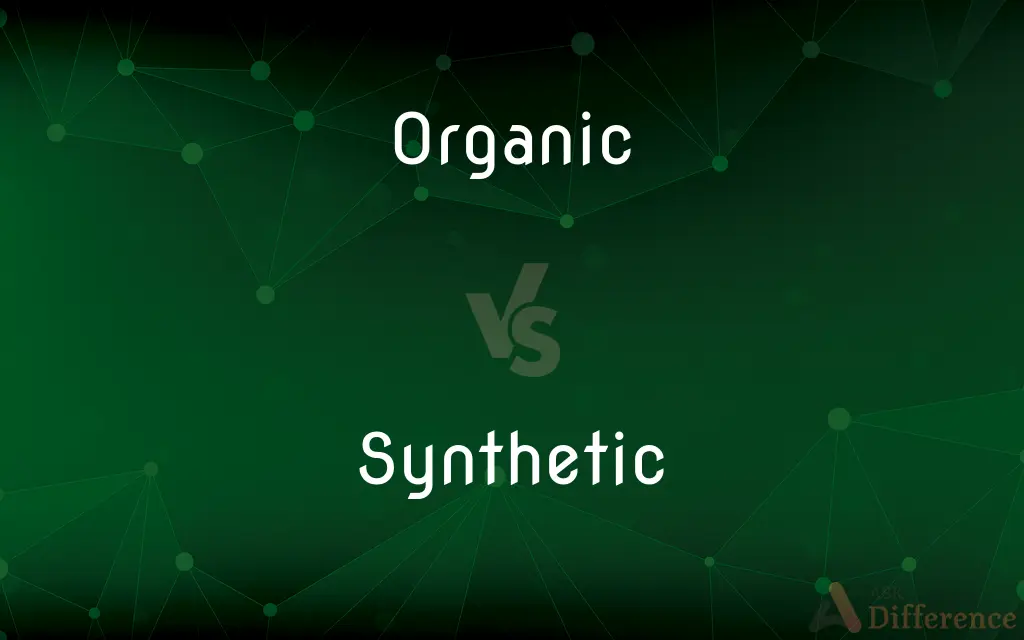Organic vs. Synthetic — What's the Difference?
By Tayyaba Rehman — Published on September 21, 2023
Organic refers to natural substances derived from living organisms, often produced without artificial chemicals. Synthetic refers to materials or substances made artificially, often mimicking natural products but created through chemical processes.

Difference Between Organic and Synthetic
Table of Contents
ADVERTISEMENT
Key Differences
Organic substances are those that are derived from living organisms and are often produced without the use of artificial chemicals or pesticides. Synthetic substances are those that are artificially made, usually through chemical processes, and often aim to mimic natural substances. Organic substances can include food, fibers, and fuels, while synthetic materials can be plastics, medications, or artificial flavors.
Organic materials are usually considered to be better for the environment due to the absence of harmful chemicals in their production. Synthetic materials, while often more durable and effective in certain applications, may produce harmful byproducts or require resource-intensive manufacturing processes. Thus, while Organic can be seen as more eco-friendly, Synthetic materials have advantages in durability and specific functionalities.
In the context of food, Organic usually refers to items grown without synthetic pesticides or fertilizers. Synthetic, in this context, could refer to processed foods with artificial flavors or preservatives. People often prefer Organic foods because they are considered to be healthier, while Synthetic foods may have a longer shelf life and can be cheaper.
In fashion, Organic materials like cotton are praised for being breathable and soft. Synthetic fabrics like polyester are lauded for their durability and resistance to environmental conditions like moisture. Both Organic and Synthetic materials have their own sets of advantages and disadvantages in various applications.
Comparison Chart
Source
Derived from living organisms
Artificially made
ADVERTISEMENT
Environmental Impact
Generally eco-friendly
May produce harmful byproducts
Applications
Food, fibers, fuels
Plastics, medications, fabrics
Chemicals Used
Usually none or natural
Often uses artificial chemicals
Costs
Generally more expensive
Generally cheaper
Compare with Definitions
Organic
Organic refers to materials derived from living organisms.
Organic cotton is grown without synthetic pesticides.
Synthetic
Synthetic means artificially made through chemical processes.
Synthetic rubber is used in car tires.
Organic
Organic often means produced without artificial chemicals.
Organic produce is favored for its lack of chemical treatments.
Synthetic
Synthetic materials often mimic natural ones.
Synthetic diamonds look like natural diamonds but are less expensive.
Organic
Organic can also refer to carbon-based chemical compounds.
Methane is an organic compound.
Synthetic
Synthetic substances can be more durable.
Synthetic fabrics resist wear and tear better than natural fibers.
Organic
Organic products are often more expensive.
Organic food usually costs more than non-organic options.
Synthetic
Synthetic products often have a longer shelf life.
Synthetic preservatives extend the life of processed foods.
Organic
Of, relating to, or derived from living organisms
Organic matter.
Synthetic
Synthetic items can be resource-intensive to produce.
The production of synthetic plastics contributes to pollution.
Organic
Of, relating to, or affecting a bodily organ
An organic disease.
Synthetic
Relating to, involving, or of the nature of synthesis.
Organic
Of, marked by, or involving the use of fertilizers or pesticides that are strictly of animal or vegetable origin
Organic vegetables.
An organic farm.
Synthetic
(Chemistry) Produced by synthesis, especially not of natural origin.
Organic
Raised or conducted without the use of drugs, hormones, or synthetic chemicals
Organic chicken.
Organic cattle farming.
Synthetic
Prepared or made artificially
Synthetic leather.
Organic
Serving organic food
An organic restaurant.
Synthetic
Not natural or genuine; artificial or contrived
“counterfeit rhetoric that flourishes when passions are synthetic” (George F. Will).
Organic
Simple, healthful, and close to nature
An organic lifestyle.
Synthetic
(Linguistics) Relating to or being a language, such as Latin or Russian, that uses inflectional affixes to express syntactic relationships.
Organic
Having properties associated with living organisms.
Synthetic
Logic & Philosophy Relating to or being a proposition that attributes to a subject a predicate not inherent in the subject, not following necessarily from logically true statements.
Organic
Resembling a living organism in organization or development; interconnected
Society as an organic whole.
Synthetic
Of or relating to a financial instrument or investment that consists entirely of derivatives, especially swap contracts.
Organic
Constituting an integral part of a whole; fundamental.
Synthetic
A synthetic chemical compound or material.
Organic
(Law) Denoting or relating to the fundamental or constitutional laws and precepts of a government or an organization.
Synthetic
Of, or relating to synthesis.
Organic
(Chemistry) Of or designating carbon compounds.
Synthetic
(chemistry) Produced by synthesis instead of being isolated from a natural source (but may be identical to a product so obtained).
Organic
An organic food or a product made from organic materials.
Synthetic
(medicine) Produced by synthesis, thought to have the same effect as its natural counterpart, but chemically different from it.
Organic
A substance, especially a fertilizer or pesticide, of animal or vegetable origin.
Synthetic
Artificial, not genuine.
Organic
(Chemistry) An organic compound.
Synthetic
(grammar) Pertaining to the joining of bound morphemes in a word (compare analytic).
Organic
(biology) Pertaining to or derived from living organisms.
Synthetic
(linguistics) Of a language, having a grammar principally dependent on the use of bound morphemes to indicate syntactic relationships (compare analytic).
Organic
Pertaining to an organ of the body of a living organism.
Synthetic
A synthetic compound.
Organic
(chemistry) Relating to the compounds of carbon, relating to natural products.
Synthetic
Of or pertaining to synthesis; consisting in synthesis or composition; as, the synthetic method of reasoning, as opposed to analytical.
Philosophers hasten too much from the analytic to the synthetic method; that is, they draw general conclusions from too small a number of particular observations and experiments.
Organic
(agriculture) Of food or food products, grown in an environment free from artificial agrichemicals, and possibly certified by a regulatory body.
Synthetic
Artificial. Cf. Synthesis, 2.
Organic
(sociology) Describing a form of social solidarity theorized by Emile Durkheim that is characterized by voluntary engagements in complex interdependencies for mutual benefit (such as business agreements), rather than mechanical solidarity, which depends on ascribed relations between people (as in a family or tribe).
Synthetic
Comprising within itself structural or other characters which are usually found only in two or more diverse groups; - said of species, genera, and higher groups. See the Note under Comprehensive, 3.
Organic
(military) Of a military unit or formation, or its elements, belonging to a permanent organization (in contrast to being temporarily attached).
Synthetic
A compound made artificially by chemical reactions
Organic
Instrumental; acting as instruments of nature or of art to a certain destined function or end.
Synthetic
Not of natural origin; prepared or made artificially;
Man-made fibers
Synthetic leather
Organic
Generated according to the ranking algorithms of a search engine, as opposed to paid placement by advertisers.
Synthetic
Involving or of the nature of synthesis (combining separate elements to form a coherent whole) as opposed to analysis;
Limnology is essentially a synthetic science composed of elements...that extend well beyond the limits of biology
Organic
Developing in a gradual or natural fashion.
The writing of the script was an organic process.
Synthetic
Systematic combining of root and modifying elements into single words
Organic
Harmonious; coherent; structured.
The production came together in an organic whole.
Synthetic
Of a proposition whose truth value is determined by observation or facts;
`all men are arrogant' is a synthetic proposition
Organic
(chemistry) An organic compound.
Synthetic
Artificial as if portrayed in a film;
A novel with flat celluloid characters
Organic
An organic food.
Synthetic
Not genuine or natural;
Counterfeit rhetoric that flourishes when passions are synthetic
Organic
(science fiction) A living organism, as opposed to a robot or hologram.
Organic
Of or pertaining to an organ or its functions, or to objects composed of organs; consisting of organs, or containing them; as, the organic structure of animals and plants; exhibiting characters peculiar to living organisms; as, organic bodies, organic life, organic remains. Cf. Inorganic.
Organic
Produced by the organs; as, organic pleasure.
Organic
Instrumental; acting as instruments of nature or of art to a certain destined function or end.
Those organic arts which enable men to discourse and write perspicuously.
Organic
Forming a whole composed of organs.
Organic
Of or pertaining to compounds which are derivatives of hydrocarbons; pertaining to, or denoting, any one of a large series of carbon-containing compounds which are related to the carbon compounds produced by biological processes (such as methane, oils, fats, sugars, alcohols, ethers, proteins, etc.) and include many substances of artificial production which may or may not occur in animals or plants; - contrasted with inorganic.
Organic
A fertilizer that is derived from animal or vegetable matter
Organic
Relating or belonging to the class of chemical compounds having a carbon basis;
Hydrocarbons are organic compounds
Organic
Of or relating to or derived from living organisms;
Organic soil
Organic
Being or relating to or derived from or having properties characteristic of living organisms;
Organic life
Organic growth
Organic remains found in rock
Organic
Involving or affecting physiology or bodily organs;
An organic disease
Organic
Of or relating to foodstuff grown or raised without synthetic fertilizers or pesticides or hormones;
Organic eggs
Organic vegetables
Organic chicken
Organic
Simple and healthful and close to nature;
An organic lifestyle
Organic
Constitutional in the structure of something (especially your physical makeup)
Organic
Organic is considered environmentally friendly.
Organic farming practices are better for soil health.
Common Curiosities
What does Organic mean?
Organic refers to substances derived from living organisms, often without artificial chemicals.
Are Synthetic products more durable?
Often, yes, Synthetic materials are engineered for durability and longevity.
Is Organic food healthier?
Many people believe Organic foods are healthier due to the absence of artificial chemicals.
Which is more expensive, Organic or Synthetic?
Typically, Organic products are more expensive than their Synthetic counterparts.
Do Organic products have a shorter shelf life?
Generally, Organic products may have a shorter shelf life without preservatives.
Is Synthetic food safe?
Synthetic foods are generally considered safe but may contain artificial preservatives.
Can Organic products be GMO-free?
Organic products are usually GMO-free but not always.
What does Synthetic mean?
Synthetic refers to substances artificially made, usually mimicking natural ones.
Is Organic better for the environment?
Generally, Organic materials have less environmental impact due to fewer harmful byproducts.
Can Synthetic materials be biodegradable?
Some Synthetic materials can be engineered to be biodegradable, but it's less common.
Is Organic farming more sustainable?
Organic farming practices are generally considered to be more sustainable.
Are Organic pesticides safer?
Organic pesticides are usually considered less harmful but are not always safer.
Can Synthetic substances mimic Organic ones?
Yes, Synthetic substances often aim to mimic Organic substances in structure and function.
Is Organic certification reliable?
Organic certification is generally reliable, but it’s good to check the certifying body.
Do Synthetic substances always involve chemicals?
Synthetic substances are usually made using chemical processes.
Share Your Discovery

Previous Comparison
Election vs. Selection
Next Comparison
Employee vs. ContractorAuthor Spotlight
Written by
Tayyaba RehmanTayyaba Rehman is a distinguished writer, currently serving as a primary contributor to askdifference.com. As a researcher in semantics and etymology, Tayyaba's passion for the complexity of languages and their distinctions has found a perfect home on the platform. Tayyaba delves into the intricacies of language, distinguishing between commonly confused words and phrases, thereby providing clarity for readers worldwide.













































